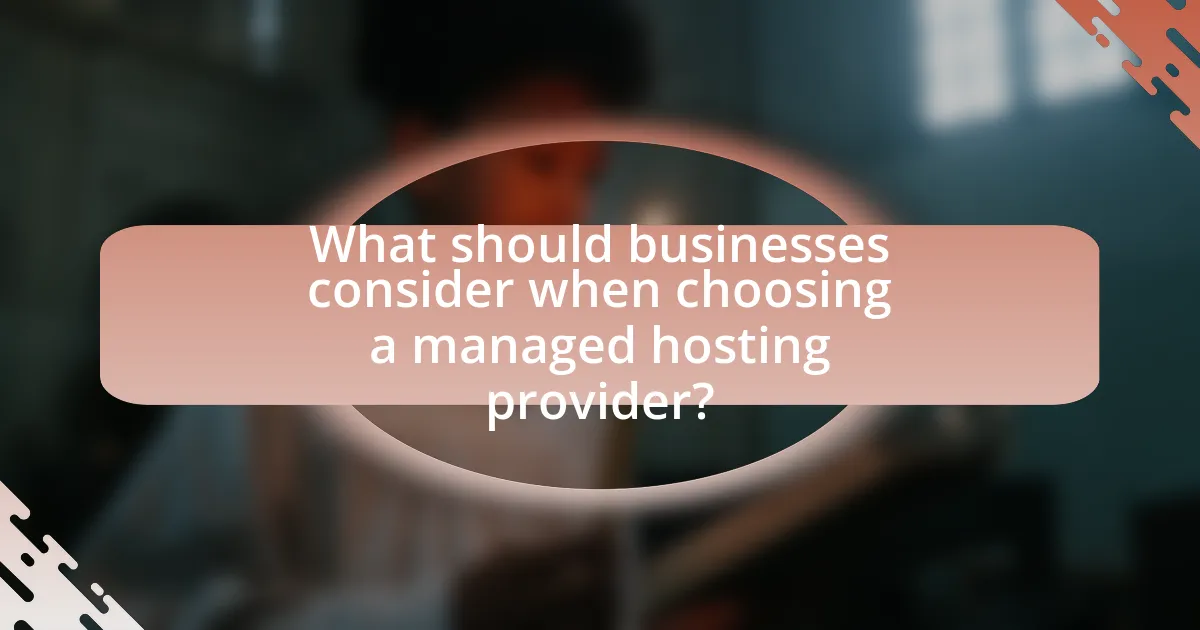The article focuses on the future of managed hosting, highlighting key trends that are shaping the industry. It discusses the increasing adoption of cloud services, enhanced security measures, and the rise of automation and AI technologies. The influence of cloud computing on managed hosting services is examined, emphasizing scalability and cost-efficiency, while hybrid cloud solutions are noted for their flexibility. Additionally, the role of automation in improving operational efficiency and the growing demand for security in managed hosting are addressed. Emerging technologies such as containerization, microservices, and edge computing are also explored, along with best practices for businesses to consider when selecting a managed hosting provider.

What are the key trends shaping the future of managed hosting?
Key trends shaping the future of managed hosting include increased adoption of cloud services, enhanced security measures, and the rise of automation and AI technologies. The shift towards cloud services is driven by businesses seeking scalability and flexibility, with a report from Gartner indicating that by 2025, 85% of organizations will have a cloud-first strategy. Enhanced security measures are becoming essential due to rising cyber threats, with a study by Cybersecurity Ventures predicting that global cybercrime costs will reach $10.5 trillion annually by 2025. Additionally, automation and AI are streamlining operations, improving efficiency, and reducing costs, as evidenced by a survey from Deloitte showing that 63% of organizations are implementing AI in their IT operations.
How is cloud computing influencing managed hosting services?
Cloud computing is significantly influencing managed hosting services by enabling greater scalability, flexibility, and cost-efficiency. Managed hosting providers are increasingly adopting cloud technologies to offer on-demand resources, allowing businesses to scale their infrastructure according to fluctuating demands without the need for substantial upfront investments. For instance, a report by Gartner indicates that the global public cloud services market is projected to grow to $623.3 billion by 2023, reflecting the increasing reliance on cloud solutions. This shift allows managed hosting services to provide enhanced performance and reliability, as cloud-based architectures can distribute workloads across multiple servers, reducing downtime and improving service delivery.
What advantages does cloud integration provide for managed hosting?
Cloud integration offers several advantages for managed hosting, primarily enhancing scalability, flexibility, and resource optimization. By leveraging cloud resources, managed hosting providers can dynamically allocate computing power and storage based on demand, allowing businesses to scale their operations efficiently without the need for significant upfront investments in hardware. Additionally, cloud integration facilitates improved disaster recovery and data redundancy, as data can be backed up across multiple locations, ensuring higher availability and reliability. Furthermore, it enables seamless integration with various applications and services, streamlining workflows and enhancing overall operational efficiency. These benefits collectively position cloud-integrated managed hosting as a robust solution for businesses seeking to adapt to evolving technological demands.
How are hybrid cloud solutions changing the managed hosting landscape?
Hybrid cloud solutions are transforming the managed hosting landscape by enabling greater flexibility and scalability for businesses. These solutions allow organizations to combine on-premises infrastructure with public and private cloud resources, facilitating optimized resource allocation based on workload demands. According to a report by Gartner, by 2025, 85% of organizations will adopt a hybrid cloud model, reflecting a significant shift in how businesses manage their IT environments. This transition enhances operational efficiency, reduces costs, and improves disaster recovery capabilities, as companies can leverage the strengths of both cloud and traditional hosting environments.
What role does automation play in the evolution of managed hosting?
Automation significantly enhances the efficiency and scalability of managed hosting services. By automating routine tasks such as server provisioning, monitoring, and maintenance, managed hosting providers can reduce human error and operational costs while improving service reliability. For instance, a study by Gartner indicates that organizations utilizing automation in IT operations can achieve up to a 30% reduction in operational expenses. This shift allows providers to focus on strategic initiatives and customer service, ultimately driving innovation in managed hosting solutions.
How can automation improve efficiency in managed hosting environments?
Automation can significantly improve efficiency in managed hosting environments by streamlining repetitive tasks and reducing human error. By implementing automation tools, managed hosting providers can automate processes such as server provisioning, monitoring, backups, and updates, which leads to faster deployment times and enhanced resource management. For instance, a study by Gartner indicates that organizations utilizing automation can reduce operational costs by up to 30% while increasing service delivery speed. This efficiency gain allows IT teams to focus on strategic initiatives rather than routine maintenance, ultimately enhancing overall productivity and service quality in managed hosting environments.
What are the potential challenges of implementing automation in managed hosting?
The potential challenges of implementing automation in managed hosting include integration complexities, security vulnerabilities, and the need for skilled personnel. Integration complexities arise when existing systems and processes must be aligned with new automated solutions, often requiring significant time and resources. Security vulnerabilities can increase as automation may expose systems to new attack vectors if not properly configured. Additionally, the need for skilled personnel is critical, as organizations must have experts who can manage, maintain, and troubleshoot automated systems effectively. According to a report by Gartner, 70% of organizations face difficulties in finding qualified staff to implement and manage automation technologies, highlighting the workforce challenge in this area.
How is the demand for security impacting managed hosting services?
The demand for security is significantly increasing the complexity and offerings of managed hosting services. As cyber threats grow in sophistication, managed hosting providers are compelled to enhance their security measures, leading to the integration of advanced security protocols, such as multi-factor authentication and intrusion detection systems. According to a report by MarketsandMarkets, the global managed security services market is projected to reach $46.4 billion by 2026, indicating a strong trend towards prioritizing security in managed hosting solutions. This shift not only elevates the level of service provided but also influences pricing structures, as clients are willing to invest more in secure hosting environments to protect sensitive data.
What security features are becoming essential in managed hosting?
Essential security features in managed hosting include advanced firewalls, DDoS protection, regular security audits, and data encryption. These features are critical as they protect against increasing cyber threats and ensure compliance with data protection regulations. For instance, according to a report by Cybersecurity Ventures, cybercrime is projected to cost the world $10.5 trillion annually by 2025, highlighting the necessity for robust security measures in managed hosting environments. Additionally, the implementation of multi-factor authentication (MFA) has become vital, as it significantly reduces the risk of unauthorized access, with studies showing that MFA can block 99.9% of automated attacks.
How do compliance requirements affect managed hosting providers?
Compliance requirements significantly impact managed hosting providers by necessitating adherence to various regulations, such as GDPR, HIPAA, and PCI-DSS. These regulations dictate how data must be stored, processed, and protected, compelling providers to implement robust security measures, regular audits, and comprehensive documentation practices. For instance, GDPR mandates strict data protection protocols, which require managed hosting providers to ensure data privacy and security for their clients, leading to increased operational costs and the need for specialized compliance teams. Additionally, failure to comply with these regulations can result in substantial fines and reputational damage, further emphasizing the importance of compliance in the managed hosting sector.

What are the emerging technologies in managed hosting?
Emerging technologies in managed hosting include containerization, serverless computing, artificial intelligence, and edge computing. Containerization, exemplified by platforms like Docker and Kubernetes, allows for efficient application deployment and management, enhancing scalability and resource utilization. Serverless computing, offered by providers such as AWS Lambda, enables developers to run code without managing servers, streamlining operations and reducing costs. Artificial intelligence is increasingly utilized for predictive analytics and automated management, improving performance and security. Edge computing reduces latency by processing data closer to the source, which is crucial for IoT applications. These technologies are reshaping the managed hosting landscape by increasing efficiency, scalability, and responsiveness to client needs.
How is artificial intelligence transforming managed hosting?
Artificial intelligence is transforming managed hosting by enhancing automation, improving resource allocation, and enabling predictive analytics. Automation through AI reduces manual intervention in server management, leading to faster deployment and maintenance processes. Improved resource allocation is achieved as AI algorithms analyze usage patterns, optimizing server performance and reducing costs. Predictive analytics allows for proactive issue resolution, minimizing downtime by anticipating potential failures before they occur. According to a report by Gartner, organizations that implement AI in their IT operations can reduce operational costs by up to 30%, demonstrating the significant impact of AI on managed hosting efficiency and reliability.
What specific AI applications are being utilized in managed hosting?
Specific AI applications utilized in managed hosting include predictive analytics for resource allocation, automated monitoring for performance optimization, and AI-driven security solutions for threat detection. Predictive analytics helps in forecasting server loads and optimizing resource distribution, thereby enhancing efficiency. Automated monitoring systems utilize machine learning algorithms to analyze performance metrics in real-time, allowing for immediate adjustments to maintain optimal service levels. AI-driven security solutions employ advanced algorithms to identify and mitigate potential threats, ensuring data integrity and compliance. These applications collectively improve operational efficiency, enhance security, and provide a better user experience in managed hosting environments.
How does AI enhance customer support in managed hosting services?
AI enhances customer support in managed hosting services by automating responses, analyzing customer interactions, and providing personalized assistance. Automation through AI chatbots allows for 24/7 support, significantly reducing response times and improving customer satisfaction. Additionally, AI systems can analyze large volumes of data from customer interactions to identify common issues and trends, enabling proactive support measures. For instance, a study by Gartner indicates that by 2025, 75% of customer service interactions will be powered by AI, demonstrating its growing role in enhancing efficiency and effectiveness in managed hosting environments.
What is the impact of edge computing on managed hosting?
Edge computing significantly enhances managed hosting by reducing latency and improving data processing speeds. This technology allows data to be processed closer to the source, minimizing the distance it must travel, which is crucial for applications requiring real-time responses. For instance, edge computing can decrease latency by up to 75%, as reported by various industry studies. Additionally, it enables better bandwidth management and reduces the load on central servers, leading to increased efficiency and reliability in managed hosting environments. This shift supports the growing demand for faster, more responsive applications, particularly in sectors like IoT and real-time analytics.
How does edge computing improve latency and performance in managed hosting?
Edge computing significantly improves latency and performance in managed hosting by processing data closer to the source of generation. This proximity reduces the distance data must travel, leading to faster response times and lower latency. For instance, a study by Cisco predicts that by 2023, 94% of workloads will be processed at the edge, which enhances the efficiency of data handling and minimizes delays. Additionally, edge computing alleviates bandwidth congestion by offloading data processing from centralized servers, allowing for more efficient resource utilization and improved overall performance in managed hosting environments.
What industries are most likely to benefit from edge computing in managed hosting?
Industries most likely to benefit from edge computing in managed hosting include healthcare, manufacturing, retail, and transportation. Healthcare can leverage edge computing for real-time patient monitoring and data processing, enhancing patient care and operational efficiency. Manufacturing benefits through improved automation and predictive maintenance, which can reduce downtime and increase productivity. Retail utilizes edge computing for personalized customer experiences and inventory management, optimizing supply chains. Transportation relies on edge computing for real-time data analysis in logistics and fleet management, improving operational efficiency. These industries are increasingly adopting edge computing to enhance performance and responsiveness, supported by the growing demand for low-latency applications and data processing capabilities.
How are containerization and microservices changing managed hosting?
Containerization and microservices are transforming managed hosting by enabling greater scalability, flexibility, and efficiency in application deployment. Containerization allows applications to run in isolated environments, which simplifies the management of dependencies and configurations, leading to faster deployment cycles. Microservices architecture breaks applications into smaller, independent services that can be developed, deployed, and scaled individually, enhancing resource utilization and reducing downtime.
According to a report by Gartner, organizations adopting microservices and containerization can achieve up to 30% faster time-to-market for new features, demonstrating the significant impact on operational efficiency. Additionally, the use of orchestration tools like Kubernetes further streamlines the management of containerized applications, allowing for automated scaling and load balancing, which is crucial for managed hosting environments.
What are the benefits of using containers in managed hosting environments?
Using containers in managed hosting environments enhances scalability, efficiency, and resource utilization. Containers allow applications to run consistently across various environments, reducing deployment times and minimizing conflicts. According to a study by the Cloud Native Computing Foundation, 78% of organizations reported improved application deployment speed after adopting container technology. Additionally, containers enable better resource allocation, as they share the host OS kernel, leading to lower overhead compared to traditional virtual machines. This results in faster startup times and the ability to run more applications on the same hardware, optimizing costs and performance in managed hosting scenarios.
How do microservices architecture enhance scalability in managed hosting?
Microservices architecture enhances scalability in managed hosting by allowing individual components of an application to be scaled independently. This modular approach enables organizations to allocate resources more efficiently, responding to varying loads without affecting the entire system. For instance, if a specific service experiences high demand, only that service can be scaled up, rather than the entire application, which optimizes resource usage and reduces costs. Additionally, microservices can be deployed across multiple servers or cloud instances, further improving scalability and resilience. This flexibility is supported by cloud providers, which often offer tools and services specifically designed for managing microservices, facilitating seamless scaling operations.

What should businesses consider when choosing a managed hosting provider?
Businesses should consider the provider’s reliability and uptime guarantees when choosing a managed hosting provider. A reliable provider typically offers at least 99.9% uptime, which is crucial for maintaining website accessibility and performance. Additionally, businesses should evaluate the level of customer support available, including response times and support channels, as effective support can significantly impact operational efficiency. Security features, such as DDoS protection and regular backups, are also essential to safeguard sensitive data. Furthermore, scalability options should be assessed to ensure the hosting solution can grow with the business’s needs. Lastly, pricing structures should be transparent and align with the budget while providing value for the services offered.
What factors are crucial for evaluating managed hosting providers?
Key factors for evaluating managed hosting providers include reliability, performance, security, support, scalability, and pricing. Reliability is essential as it ensures minimal downtime, which can significantly impact business operations; for instance, a study by Gartner indicates that downtime can cost businesses up to $5,600 per minute. Performance is critical, as faster load times enhance user experience and SEO rankings; according to Google, a one-second delay can reduce conversions by 7%. Security measures, such as data encryption and compliance with standards like GDPR, protect sensitive information and build trust. Support availability, including 24/7 assistance, is vital for resolving issues promptly, as highlighted by a survey from Zendesk showing that 66% of consumers feel that valuing their time is the most important thing a company can do. Scalability allows businesses to adapt to changing demands without significant disruptions, and competitive pricing ensures that services align with budget constraints while providing value.
How important is customer support in selecting a managed hosting provider?
Customer support is critically important in selecting a managed hosting provider. Effective customer support ensures that clients receive timely assistance during technical issues, which can significantly impact website performance and uptime. According to a survey by HostingAdvice, 70% of users consider customer support a key factor when choosing a hosting provider, highlighting its role in maintaining operational efficiency and user satisfaction. Reliable customer support can also lead to quicker resolution of problems, minimizing downtime and potential revenue loss for businesses.
What role does service level agreement (SLA) play in the decision-making process?
A service level agreement (SLA) serves as a critical framework in the decision-making process by clearly defining the expectations, responsibilities, and performance metrics between service providers and clients. This clarity helps organizations assess potential vendors based on their ability to meet specific service standards, such as uptime guarantees and response times. For instance, a study by the International Association for Contract and Commercial Management indicates that 70% of organizations that utilize SLAs report improved service delivery and accountability. Thus, SLAs not only guide decision-making but also enhance trust and collaboration between parties involved in managed hosting services.
How can businesses ensure they are future-proofing their managed hosting solutions?
Businesses can ensure they are future-proofing their managed hosting solutions by adopting scalable infrastructure, leveraging cloud technologies, and implementing robust security measures. Scalable infrastructure allows businesses to adjust resources based on demand, ensuring they can handle growth without significant downtime or investment. Cloud technologies, such as hybrid and multi-cloud environments, provide flexibility and redundancy, which are essential for adapting to changing market conditions. Additionally, robust security measures, including regular updates and compliance with industry standards, protect against evolving cyber threats, thereby safeguarding business operations. According to a report by Gartner, organizations that utilize cloud services can achieve up to 30% cost savings while enhancing their agility and scalability, reinforcing the importance of these strategies in future-proofing managed hosting solutions.
What strategies can organizations adopt to adapt to changing managed hosting trends?
Organizations can adopt several strategies to adapt to changing managed hosting trends, including embracing cloud integration, enhancing security measures, and focusing on scalability. Cloud integration allows organizations to leverage hybrid and multi-cloud environments, which are increasingly popular due to their flexibility and cost-effectiveness. Enhanced security measures, such as implementing advanced encryption and compliance protocols, are essential as cyber threats evolve. Additionally, focusing on scalability enables organizations to adjust resources dynamically in response to fluctuating demands, ensuring optimal performance and cost management. These strategies are supported by industry reports indicating that 94% of enterprises use cloud services, highlighting the shift towards cloud-based solutions in managed hosting.
How can businesses assess the scalability of their managed hosting solutions?
Businesses can assess the scalability of their managed hosting solutions by evaluating performance metrics, resource allocation flexibility, and the provider’s ability to accommodate growth. Performance metrics, such as response times and uptime statistics, indicate how well the hosting solution can handle increased traffic. Resource allocation flexibility allows businesses to adjust their resources, such as CPU and memory, based on demand, ensuring that the hosting solution can scale efficiently. Additionally, examining the provider’s track record in supporting clients during periods of growth, including case studies or testimonials, can provide concrete evidence of their capability to scale effectively.
What best practices should organizations follow when implementing managed hosting?
Organizations should follow several best practices when implementing managed hosting, including thorough vendor evaluation, clear service level agreements (SLAs), and robust security measures. Thorough vendor evaluation ensures that organizations select a provider with a proven track record, relevant experience, and the necessary technical capabilities. Clear SLAs define expectations regarding uptime, support response times, and performance metrics, which are critical for accountability. Robust security measures, such as regular audits and compliance with industry standards, protect sensitive data and maintain trust. According to a report by Gartner, organizations that implement these best practices can reduce downtime by up to 50% and enhance overall service reliability.
How can businesses effectively migrate to a managed hosting environment?
Businesses can effectively migrate to a managed hosting environment by conducting a thorough assessment of their current infrastructure and identifying specific needs. This involves evaluating existing applications, data, and workloads to determine compatibility with managed hosting services. Additionally, businesses should select a reputable managed hosting provider that aligns with their requirements, ensuring they offer necessary features such as scalability, security, and support.
Furthermore, creating a detailed migration plan that outlines timelines, resource allocation, and risk management strategies is crucial. Testing the migration process in a controlled environment can help identify potential issues before full deployment. According to a study by Gartner, organizations that follow a structured migration approach experience 30% fewer disruptions during the transition. This structured methodology, combined with ongoing monitoring and optimization post-migration, ensures a smooth transition to a managed hosting environment.
What ongoing maintenance practices are essential for managed hosting success?
Ongoing maintenance practices essential for managed hosting success include regular software updates, performance monitoring, security audits, and backup management. Regular software updates ensure that the hosting environment remains secure and efficient, as outdated software can lead to vulnerabilities. Performance monitoring allows for the identification of bottlenecks and resource allocation issues, which can be addressed proactively to maintain optimal service levels. Security audits are critical for identifying potential threats and ensuring compliance with industry standards, thereby protecting sensitive data. Lastly, effective backup management guarantees data integrity and availability, allowing for quick recovery in case of data loss. These practices collectively contribute to the reliability and security of managed hosting services.


